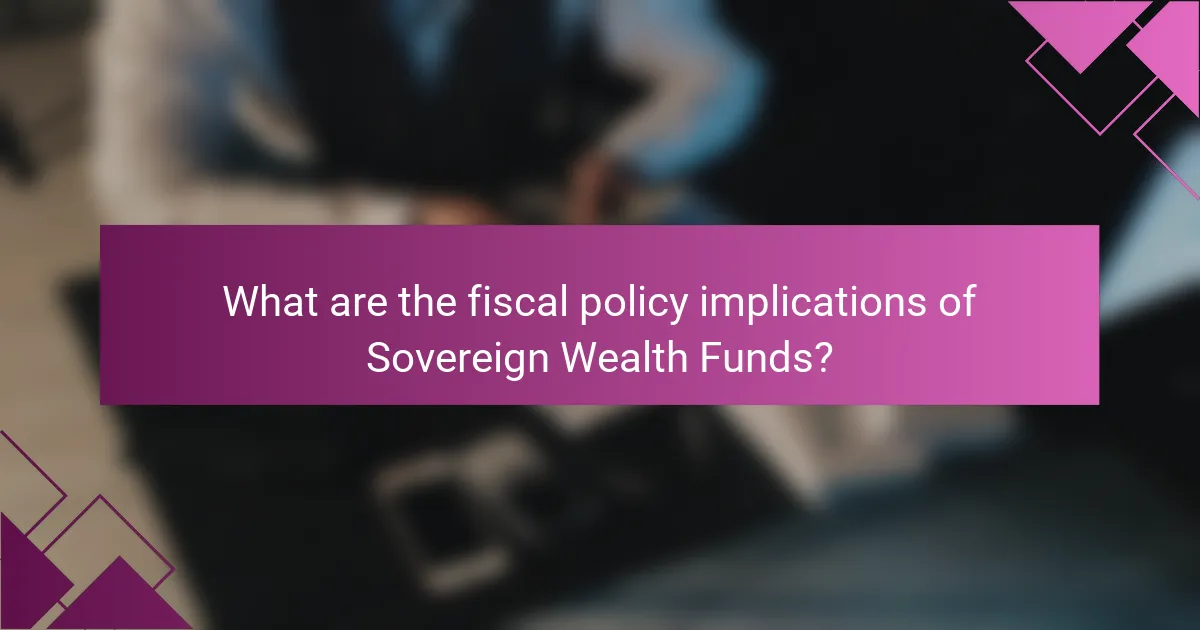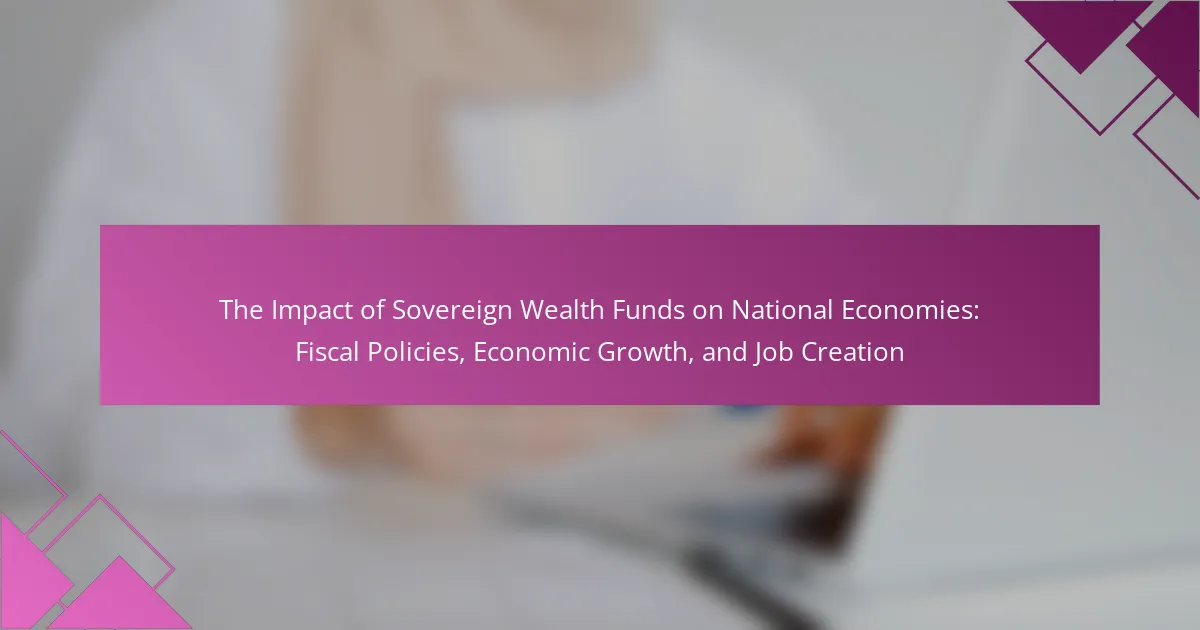
What are Sovereign Wealth Funds and their Purpose?
Sovereign Wealth Funds (SWFs) are state-owned investment funds. They are established to manage a country’s reserves and assets. Their primary purpose is to invest in various financial instruments. This includes stocks, bonds, real estate, and infrastructure. SWFs aim to generate returns for future generations. They also stabilize the economy during downturns. For example, the Government Pension Fund of Norway invests oil revenues. This fund has grown to over $1 trillion, demonstrating effective wealth management. SWFs play a key role in global financial markets. They influence economic stability and growth in their home countries.
How do Sovereign Wealth Funds operate within national economies?
Sovereign Wealth Funds (SWFs) are state-owned investment funds that operate within national economies to manage and invest national savings. They typically invest in a variety of assets, including stocks, bonds, real estate, and infrastructure projects. SWFs aim to achieve long-term financial returns and stabilize the economy by diversifying income sources.
For example, the Government Pension Fund of Norway invests surplus revenues from the petroleum sector. This fund helps mitigate the effects of oil price volatility on the national economy. SWFs also contribute to economic growth by funding domestic projects, which can create jobs and stimulate local industries.
In addition, they can influence fiscal policies by providing governments with additional revenue streams. This can reduce dependence on taxation and allow for more flexibility in budgetary decisions. SWFs play a crucial role in maintaining economic stability and promoting sustainable development within national economies.
What are the key components of Sovereign Wealth Funds?
Sovereign Wealth Funds (SWFs) are state-owned investment funds. They are primarily funded by national revenues, such as surplus reserves from trade. SWFs invest in a variety of assets, including stocks, bonds, real estate, and commodities. Their key components include governance structures, investment strategies, and risk management frameworks. Governance structures ensure accountability and transparency in fund operations. Investment strategies dictate how funds allocate resources to achieve financial returns. Risk management frameworks assess and mitigate potential financial risks associated with investments. According to the International Working Group of Sovereign Wealth Funds, these components are essential for effective fund management and performance.
How do these components influence fiscal policies?
Sovereign wealth funds (SWFs) influence fiscal policies by providing governments with additional financial resources. These funds can stabilize national budgets during economic downturns. SWFs allow for increased public spending on infrastructure and social programs. They also enable governments to invest in strategic sectors for long-term growth. By diversifying revenue sources, SWFs reduce reliance on volatile commodity prices. Countries with SWFs often experience improved credit ratings due to enhanced fiscal stability. For example, Norway’s Government Pension Fund has helped maintain low public debt levels. This stability promotes investor confidence and economic resilience.
Why are Sovereign Wealth Funds important for economic growth?
Sovereign Wealth Funds (SWFs) are important for economic growth because they provide long-term capital to invest in various sectors. These funds help stabilize economies during downturns by counter-cyclical investments. SWFs often invest in infrastructure projects, which can create jobs and boost productivity. According to the International Monetary Fund, SWFs can enhance fiscal stability by diversifying government revenue sources. They also contribute to financial markets by providing liquidity. In 2021, SWFs managed over $10 trillion in assets globally, demonstrating their significant role in the economy. By investing in emerging markets, SWFs can foster innovation and technological advancement. Overall, SWFs are critical for sustainable economic development and resilience.
What role do Sovereign Wealth Funds play in stabilizing economies?
Sovereign Wealth Funds (SWFs) play a crucial role in stabilizing economies by providing a buffer against economic shocks. They accumulate wealth from national resources, such as oil or gas revenues. This wealth can be utilized during economic downturns to maintain public spending. For example, during the 2008 financial crisis, many countries used SWFs to support their economies. SWFs also invest in diverse global assets, which helps mitigate risks associated with domestic economic fluctuations. Research shows that countries with robust SWFs experience lower volatility in economic performance. By stabilizing currency and financial markets, SWFs contribute to overall economic resilience.
How do they contribute to public investment and infrastructure development?
Sovereign wealth funds (SWFs) contribute to public investment and infrastructure development by providing significant capital for large-scale projects. They invest in various sectors, including transportation, energy, and healthcare. This investment supports job creation and stimulates economic growth. According to the International Forum of Sovereign Wealth Funds, SWFs have allocated over $3 trillion toward infrastructure globally. Their long-term investment strategies align with public sector goals, enhancing infrastructure quality. Additionally, SWFs often collaborate with governments to finance public-private partnerships. This collaboration leads to improved public services and facilities.
What impact do Sovereign Wealth Funds have on job creation?
Sovereign Wealth Funds (SWFs) significantly impact job creation by investing in various sectors. These investments often lead to the establishment of new businesses. For example, SWFs frequently invest in infrastructure projects that generate numerous jobs. A report by the International Monetary Fund indicates that SWFs can promote economic stability, which in turn fosters job growth. Furthermore, investments in technology and innovation sectors by SWFs can create high-skilled job opportunities. In countries like Norway, the Government Pension Fund has contributed to job creation through diverse investments. Overall, SWFs play a crucial role in enhancing employment opportunities through strategic investments.
How do investments from Sovereign Wealth Funds lead to employment opportunities?
Investments from Sovereign Wealth Funds (SWFs) lead to employment opportunities by financing infrastructure projects and supporting local businesses. These funds often invest in sectors like real estate, technology, and renewable energy. Such investments create jobs directly through construction and development. Additionally, they stimulate indirect job creation by boosting local economies. For instance, a study by the International Monetary Fund found that SWF investments can increase employment in host countries by up to 1.5%. Furthermore, SWFs often engage in partnerships with local firms, enhancing skills and creating long-term job prospects. Overall, the capital infusion from SWFs translates into a more dynamic job market.
Which sectors benefit most from job creation linked to Sovereign Wealth Funds?
The sectors that benefit most from job creation linked to Sovereign Wealth Funds are infrastructure, healthcare, and technology. Infrastructure projects often receive significant funding from Sovereign Wealth Funds. This leads to job creation in construction, engineering, and related fields. The healthcare sector also benefits through investments in hospitals and health services. This investment enhances employment opportunities for medical professionals and support staff. Additionally, the technology sector sees growth through funding for startups and innovation initiatives. This funding creates jobs in software development, engineering, and research. Overall, these sectors experience substantial job creation due to the strategic investments made by Sovereign Wealth Funds.

What are the fiscal policy implications of Sovereign Wealth Funds?
Sovereign Wealth Funds (SWFs) influence fiscal policy by providing governments with additional revenue sources. These funds can stabilize national economies during downturns. SWFs often invest in diverse assets, generating income that can support public spending. For instance, countries like Norway have utilized SWF returns to fund welfare programs. This reduces reliance on taxation and borrowing. Furthermore, SWFs can enhance fiscal sustainability by diversifying revenue streams. They can also mitigate the effects of commodity price volatility on national budgets. The presence of SWFs can lead to more prudent fiscal management and long-term planning.
How do Sovereign Wealth Funds influence government budgeting?
Sovereign Wealth Funds (SWFs) influence government budgeting by providing additional revenue streams. These funds are state-owned investment funds that manage national savings for various purposes. They can stabilize government finances during economic downturns by supplementing budget deficits. SWFs often invest in diverse assets, generating returns that can be used for public spending. For example, Norway’s Government Pension Fund Global contributes significantly to the national budget, allowing for increased social welfare spending. Additionally, SWFs can help reduce reliance on volatile revenue sources like oil or taxes. This financial stability allows governments to plan long-term fiscal policies more effectively. Overall, SWFs play a crucial role in enhancing fiscal resilience and promoting sustainable economic growth.
What are the short-term and long-term fiscal impacts of these funds?
Sovereign wealth funds can have significant short-term and long-term fiscal impacts on national economies. In the short term, these funds can provide immediate liquidity to governments, enabling them to finance public projects and stabilize economies during downturns. For instance, during economic crises, sovereign wealth funds can be tapped to support fiscal policies that stimulate growth.
In the long term, these funds can contribute to economic stability and growth by investing in diverse assets, which generates returns over time. A study by the International Monetary Fund (IMF) indicates that countries with sovereign wealth funds often experience improved fiscal discipline and sustainable economic growth due to the long-term nature of these investments.
Additionally, the strategic investments made by sovereign wealth funds can lead to job creation and infrastructure development, further enhancing economic performance. Overall, the fiscal impacts of sovereign wealth funds are both immediate and enduring, influencing national economies in multifaceted ways.
How do Sovereign Wealth Funds affect national debt and deficit levels?
Sovereign Wealth Funds (SWFs) can reduce national debt and deficit levels. They achieve this by providing governments with additional revenue. This revenue can be used to fund public services or pay down existing debt. For instance, countries like Norway utilize their SWF to support their budget, lowering the need for borrowing. Additionally, SWFs can stabilize national finances during economic downturns. By investing in diverse assets, they generate returns that can offset budget deficits. The presence of a robust SWF can also enhance investor confidence. This confidence can lead to lower borrowing costs for the government. Overall, effective management of SWFs contributes positively to fiscal health.
What are the challenges associated with managing Sovereign Wealth Funds?
The challenges associated with managing Sovereign Wealth Funds (SWFs) include political interference, investment risk, and transparency issues. Political interference can lead to decisions based on political agendas rather than sound financial principles. Investment risk arises from market volatility and the difficulty in achieving desired returns. Transparency issues can create mistrust among stakeholders, leading to calls for greater accountability. Additionally, managing diverse assets across various sectors complicates oversight. The global nature of investments exposes SWFs to geopolitical risks as well. These challenges can hinder the effectiveness of SWFs in contributing to national economic stability and growth.
What risks do Sovereign Wealth Funds pose to national economies?
Sovereign Wealth Funds (SWFs) pose several risks to national economies. One significant risk is market distortion. Large investments by SWFs can lead to inflated asset prices. This can create bubbles that may eventually burst, harming economic stability. Another risk involves geopolitical influence. SWFs can be used as tools for political leverage, impacting national sovereignty. Additionally, there is a risk of reduced transparency. Many SWFs operate with limited public oversight, which can lead to mismanagement or corruption. Furthermore, reliance on SWF investments can create economic dependency. This may undermine local businesses and industries. Historical instances, such as the fallout from the 2008 financial crisis, illustrate the potential negative impacts of SWFs on economic systems. These risks highlight the need for careful regulation and oversight of Sovereign Wealth Funds.
How can transparency and governance improve the effectiveness of these funds?
Transparency and governance enhance the effectiveness of sovereign wealth funds by fostering accountability and trust. Clear reporting practices allow stakeholders to assess fund performance and allocation of resources. Governance structures ensure that funds are managed in accordance with established policies and objectives. This alignment with national interests can lead to better investment decisions. Research indicates that well-governed funds are more likely to achieve sustainable returns. For instance, the International Monetary Fund highlights that transparency can reduce corruption and mismanagement in fund operations. Effective governance frameworks also facilitate stakeholder engagement, leading to more informed decision-making processes. Overall, these factors contribute to the improved performance of sovereign wealth funds in supporting national economies.

How do Sovereign Wealth Funds interact with global markets?
Sovereign Wealth Funds (SWFs) interact with global markets primarily through investment activities. They allocate capital to various asset classes, including equities, bonds, real estate, and alternative investments. This investment behavior influences market liquidity and pricing dynamics. For instance, in 2020, SWFs managed over $9 trillion in assets globally, impacting both emerging and developed markets.
Their investment strategies often aim for long-term returns, which can stabilize market fluctuations during economic downturns. Furthermore, SWFs engage in direct investments in companies, fostering partnerships and enhancing corporate governance. These interactions can lead to significant economic influence in the regions where they invest.
Additionally, SWFs often participate in public-private partnerships, which can drive infrastructure development and job creation. Their presence in global markets can attract other investors, amplifying the economic impact. Overall, the interaction of SWFs with global markets reflects their role as major institutional investors, shaping economic landscapes worldwide.
What strategies do Sovereign Wealth Funds use for international investments?
Sovereign Wealth Funds (SWFs) employ several strategies for international investments. They typically diversify their portfolios across various asset classes. This includes equities, fixed income, real estate, and alternative investments. SWFs often invest in foreign companies and infrastructure projects to achieve higher returns. They also seek long-term growth by focusing on emerging markets. Risk management is crucial, with many funds using hedging techniques. Additionally, SWFs may engage in co-investments with private equity firms. According to the Sovereign Wealth Fund Institute, global SWFs managed over $10 trillion as of 2021, highlighting their significant impact on international markets.
How do these strategies impact global economic stability?
Sovereign wealth fund strategies significantly influence global economic stability. These funds often invest in diverse asset classes, providing liquidity during financial crises. By stabilizing markets, they help mitigate volatility. Additionally, they promote long-term investments in infrastructure and development projects. This fosters economic growth, which is vital for stability. Research indicates that countries with active sovereign wealth funds experience less economic fluctuation. For instance, the Norwegian Government Pension Fund has been linked to economic resilience during downturns. Thus, effective strategies of sovereign wealth funds contribute positively to global economic stability.
What are the implications of Sovereign Wealth Funds on foreign relations?
Sovereign Wealth Funds (SWFs) significantly influence foreign relations by shaping investment strategies and diplomatic ties. These funds, often state-owned, invest in foreign assets, which can enhance economic partnerships. For example, countries like Norway and Singapore use their SWFs to foster bilateral relations through strategic investments.
SWFs can also lead to geopolitical shifts. When a nation invests heavily in another, it may gain leverage in negotiations or influence policy decisions. The United Arab Emirates has leveraged its SWF investments to strengthen ties in Asia and Africa.
Moreover, SWFs can create dependency. Countries receiving investments may align their policies to favor the investing nation. A notable case is China’s investments through its SWF, which have led to increased political influence in various regions.
These funds can also provoke scrutiny. Investments in sensitive sectors may raise national security concerns, leading to regulatory pushback. For instance, the U.S. has imposed restrictions on foreign investments in critical industries, reflecting apprehension over SWF influence.
In summary, SWFs play a crucial role in foreign relations through investment strategies, geopolitical influence, and economic dependencies.
What best practices can enhance the effectiveness of Sovereign Wealth Funds?
Best practices that can enhance the effectiveness of Sovereign Wealth Funds include establishing clear investment objectives. These objectives should align with national economic goals. Robust governance structures are essential for transparency and accountability. Regular performance evaluations help in adjusting strategies based on results. Diversification of investment portfolios reduces risk and increases potential returns. Engaging with stakeholders fosters trust and supports long-term planning. Adopting sustainable investment practices aligns with global standards and ethical considerations. Lastly, continuous education and training for fund managers improve decision-making capabilities and investment outcomes.
How can nations optimize the use of Sovereign Wealth Funds for sustainable growth?
Nations can optimize the use of Sovereign Wealth Funds (SWFs) for sustainable growth by implementing strategic investment policies. These policies should prioritize long-term returns over short-term gains. SWFs can focus on sustainable sectors such as renewable energy, education, and healthcare. Diversifying investments across various asset classes enhances resilience against market fluctuations.
Additionally, establishing transparent governance frameworks fosters accountability and attracts foreign investment. Engaging with local communities ensures that investments align with national development goals. Countries like Norway demonstrate effective SWF management, achieving substantial economic growth while promoting sustainability. This approach leads to job creation and improved public services.
What lessons can be learned from successful Sovereign Wealth Fund models?
Successful Sovereign Wealth Fund models demonstrate the importance of long-term investment strategies. They prioritize diversification to minimize risk and maximize returns. Transparency in operations fosters public trust and accountability. Effective governance structures ensure that funds are managed efficiently. Strong regulatory frameworks protect against mismanagement and corruption. Collaboration with global investment partners enhances knowledge and expertise. Case studies, such as Norway’s Government Pension Fund Global, show significant returns and positive economic impact. These lessons underline the need for strategic planning and disciplined management in sovereign wealth funds.
Sovereign Wealth Funds (SWFs) are state-owned investment funds designed to manage national reserves and assets, primarily investing in various financial instruments to generate returns and stabilize economies. This article examines the impact of SWFs on national economies, focusing on their role in fiscal policies, economic growth, and job creation. Key components of SWFs, their governance, and investment strategies are explored, along with their influence on public investment and infrastructure development. Additionally, the article discusses the challenges associated with managing SWFs and best practices for optimizing their effectiveness in promoting sustainable growth.
